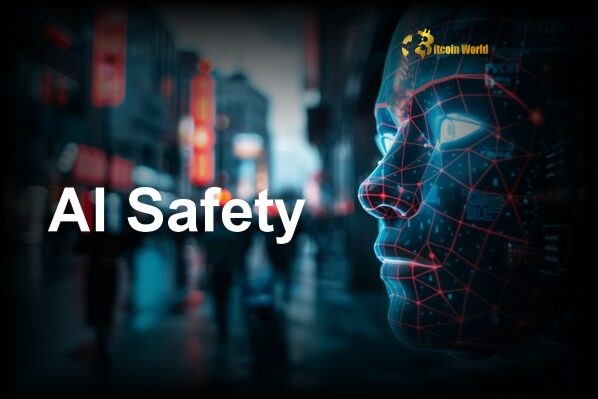Crucial AI Safety: New York Passes Landmark Bill Targeting Frontier AI Labs
0
0
BitcoinWorld

Crucial AI Safety: New York Passes Landmark Bill Targeting Frontier AI Labs
In a move resonating across the tech world, New York state lawmakers have taken a significant step toward addressing the potential risks posed by advanced artificial intelligence. This development is particularly relevant to the cryptocurrency and blockchain community, which often intersects with cutting-edge technology and its regulatory landscape. The recently passed bill, known as the RAISE Act, aims to establish guardrails around powerful frontier AI models developed by major players like OpenAI, Google, and Anthropic.
What is the New York AI Bill All About?
The core purpose of the New York AI bill is to prevent future disaster scenarios potentially fueled by advanced AI systems. The bill specifically defines a disaster as an event causing death or injury to more than 100 people, or resulting in over $1 billion in damages. This focus on tangible, high-impact harm distinguishes the bill’s scope.
The passage of the RAISE Act is seen as a notable victory for the AI safety movement. This group, which includes prominent figures like Nobel laureate Geoffrey Hinton and AI pioneer Yoshua Bengio, advocates for prioritizing caution and safety measures as AI technology rapidly advances. Their support highlights the bill’s alignment with calls from leading researchers for responsible AI development.
Boosting Transparency Among Leading AI Labs
A key component of the RAISE Act is its requirement for enhanced transparency from major AI labs. Should the bill be signed into law by Governor Kathy Hochul, it would mandate that the world’s largest AI companies publish detailed safety and security reports on their frontier models. This would be America’s first set of legally required transparency standards for such advanced AI.
The bill also includes provisions requiring these companies to report safety incidents. This could involve disclosing concerning behaviors exhibited by an AI model or reporting instances of bad actors attempting to steal or misuse an AI system. Failure to meet these standards could result in significant civil penalties, potentially up to $30 million, enforceable by the New York Attorney General.
Comparing New York’s Approach to Previous AI Regulation Efforts
The RAISE Act shares many goals and provisions with California’s earlier attempt at AI regulation, SB 1047, which ultimately faced a veto. However, sponsors of the New York bill, like state Senator Andrew Gounardes, emphasize that they deliberately designed the RAISE Act to avoid stifling innovation, particularly among startups and academic researchers. This was a common criticism leveled against the California bill.
Senator Gounardes noted the urgency of implementing safeguards, stating, “The window to put in place guardrails is rapidly shrinking given how fast this technology is evolving.” He added that even experts familiar with AI express alarm about the likelihood of these risks, underscoring the motivation behind the bill.
Addressing Industry Concerns and the Scope of the Bill
The RAISE Act is specifically designed to regulate the world’s largest companies whose AI models were trained using more than $100 million in computing resources and are available to New York residents. This includes tech giants based both domestically and internationally, such as OpenAI, Google, DeepSeek, and Alibaba.
Despite this focused approach, the bill has faced pushback from Silicon Valley. New York state Assemblymember Alex Bores, a co-sponsor, acknowledged this resistance but maintained that the bill would not hinder innovation. Even Anthropic, an AI safety focused company, expressed some reservations, with co-founder Jack Clark noting concerns that the bill might be too broad and potentially impact smaller companies, a criticism Senator Gounardes disputed, reiterating the bill’s narrow focus on large entities.
Another common concern raised, similar to debates around European tech regulations, is that AI model developers might simply choose not to offer their most advanced models in New York. Assemblymember Bores countered this, suggesting the regulatory burden is light enough that withdrawing from the state wouldn’t be economically justified, especially given New York’s significant GDP. He expressed confidence that while there might be “political pettiness,” there are no strong economic reasons for companies to withhold their services from New York residents.
The Path Forward for the RAISE Act
With passage in the state legislature, the RAISE Act now awaits review by New York Governor Kathy Hochul. She has several options: signing it into law, sending it back for potential amendments, or vetoing it. The tech and safety communities will be closely watching her decision, as signing it would make New York the first state in America with legally mandated transparency standards specifically for advanced AI labs.
Summary: A Step Towards Accountable AI
The passage of the RAISE Act in New York marks a significant legislative effort to proactively address the potential catastrophic risks associated with powerful frontier AI models. By focusing on transparency, incident reporting, and civil penalties for the largest AI labs, the bill aims to establish a framework for accountability. While facing industry pushback and comparisons to previous regulatory attempts, sponsors argue the bill is narrowly tailored to promote AI safety without stifling innovation, particularly for smaller entities. The fate of this potentially landmark AI regulation now rests with the Governor.
To learn more about the latest AI regulation trends, explore our article on key developments shaping AI policy.
This post Crucial AI Safety: New York Passes Landmark Bill Targeting Frontier AI Labs first appeared on BitcoinWorld and is written by Editorial Team
0
0
 Manage all your crypto, NFT and DeFi from one place
Manage all your crypto, NFT and DeFi from one placeSecurely connect the portfolio you’re using to start.




